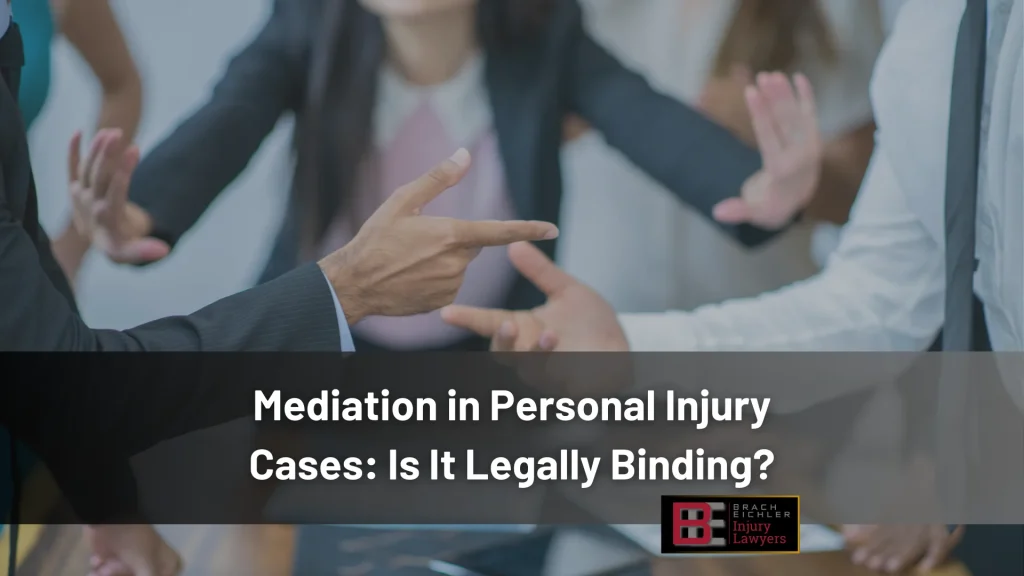
People without much experience with the legal system often think that all personal injury cases require a trial. The truth is that trials are risky and expensive, and few personal injury cases reach the trial stage. Instead, most personal injury cases end with an out-of-court settlement, often after mediation. But is mediation legally binding in a personal injury case?
The short answer is that a signed and notarized mediation agreement is a legally binding contract. However, a judge still needs to approve a settlement agreement before it has the force of a court order, and there are ways to challenge a signed settlement agreement. Today’s blog from the New Jersey trial lawyers at Brach Eichler Injury Lawyers explores mediation in personal injury cases and when it’s legally binding.
What Does Mediation Mean in a Lawsuit?
Mediation is a voluntary process where both sides in a personal injury lawsuit discuss their issues under the guidance of a neutral third party. This neutral party is called the mediator. Unlike in court proceedings, the mediator doesn’t make a ruling in a personal injury case. Instead, they help guide the conversation to foster mutual agreement. Let’s break down how this process unfolds:
- Choosing a Mediator: Both parties must agree on a professional who is not only neutral but also deeply understands personal injury law.
- Pre-Mediation Preparations: Before the actual mediation day, both sides prepare by gathering necessary documents, evidence, and key points they wish to discuss. This might include medical records, accident reports, and other information relevant to the case.
- Opening Statements: The actual mediation session starts with opening statements. The mediator explains the rules and goals of mediation and then gives each side the opportunity to present their case without interruption.
- Joint Discussion: Following the opening statements, a joint discussion usually takes place. Here, the parties can ask questions, clarify points, and express their concerns directly. The mediator facilitates this exchange, ensuring it remains productive and respectful.
- Private Caucuses: Following the joint discussion, the mediator meets with each party privately. These meetings allow for confidential, open discussions about each party’s positions, as well as exploration of potential compromises.
- Negotiation: Armed with insights from the caucuses, the mediator goes back and forth between the parties, bringing counter demands and counter offers and helping them reach an agreement.
- Agreement and Closure: If the parties reach an agreement, it’s typically put into writing there and then. Once signed, the settlement agreement becomes a binding contract. If no agreement is reached, the mediator will discuss the next steps. These next steps might include further mediation or other legal options.
Pros and Cons of Mediation in a Personal Injury Case
Mediation offers informal proceedings with the flexibility of personal negotiation. However, it comes with certain advantages and drawbacks.
Pros of Mediation:
- Cost-Effective: Mediation often costs less than going to court because it’s quicker and involves fewer legal fees.
- Faster Resolution: The mediation process in personal injury is typically much faster than a trial, meaning you can resolve the case sooner.
- Control Over Outcome: In mediation, both parties have a say in the final agreement, unlike in court, where a judge or jury decides.
- Confidentiality: Unlike court cases, which are public, mediation is private. This can help protect your personal information and the details of your case.
Cons of Mediation:
- No Guaranteed Resolution: Mediation doesn’t always result in an agreement. If it fails, you might need a trial regardless, prolonging the process.
- Potentially Unequal Power Dynamics: If one party is more assertive or has more resources, they might dominate the process, leading to an unfair outcome.
- Lack of Formal Discovery: In court, you have the right to formal discovery, where you can obtain evidence from the other party. Mediation doesn’t always allow for that level of in-depth information gathering, which could affect the negotiation.
- No Legal Precedent: Mediation outcomes don’t set a legal precedent, which means the resolution of your case won’t help or guide others in similar situations.
Types of Alternative Dispute Resolution: Mediation vs. Arbitration
Arbitration, like mediation, is a way to settle disputes outside of court, but it’s like having a private judge. In arbitration, both parties present their case to an arbitrator or a panel of arbitrators. The arbitrator or panel then makes a decision based on the evidence and arguments. This decision, often called an “award,” is usually final and binding, meaning you must abide by it.
While both mediation and arbitration aim to resolve conflicts, they’re like apples and oranges in how they do it. Mediation is all about cooperation, with a mediator helping everyone talk things out to reach a mutual agreement. It’s flexible, and the parties have control over the outcome. On the flip side, arbitration is more like a simplified court trial. The arbitrator has the power to decide the outcome, and there’s less room for the parties to shape the result.
Can You Change an Agreement After Mediation?
 Can you back out of a mediation agreement after signing it, especially if it’s about “mediation legally binding in a personal injury case”? Yes, but it’s not always easy. The crucial thing to remember is that any change to the agreement typically needs approval from everyone involved. This means if both parties have a change of heart or new information arises, they can discuss and tweak the deal.
Can you back out of a mediation agreement after signing it, especially if it’s about “mediation legally binding in a personal injury case”? Yes, but it’s not always easy. The crucial thing to remember is that any change to the agreement typically needs approval from everyone involved. This means if both parties have a change of heart or new information arises, they can discuss and tweak the deal.
However, if only one party wants to change the agreement, they face an uphill climb. Since the agreement made during mediation is a pact between both parties, altering it isn’t straightforward. It would require convincing a court that there’s a compelling reason to change the agreement without the other party’s consent. This might involve showing that the agreement was based on incomplete or incorrect information. Alternatively, circumstances may have changed so dramatically that the original terms are unfair. Attempting to change a settlement agreement signed after mediation usually requires help from a skilled and experienced attorney.
Contact Our New Jersey Mediation Lawyers Today
While mediation is less adversarial and formal than courtroom proceedings, you still need a lawyer’s help. Our team of attorneys from New Jersey personal injury attorneys at Brach Eichler Injury Lawyers have extensive experience with mediation and can help you through the process. Call (973) 364-8300 today or complete our contact form for your free consultation.
Related posts:
- How Much Do Lawyers Take from a Settlement
- How Much Tax Is Paid on Lawsuit Settlements | Free Consultation
We are the trial attorneys with the experience and knowledge to get you the results you deserve. At Brach Eichler Injury Lawyers, we take time to get to know you, as well as your case. We are committed to excellence. It is important for our team to understand your fears, concerns and expectations. We are always available to answer any questions, and are willing to come to you if you are unable to come to us.
Contact Your New Jersey Personal Injury Attorneys
